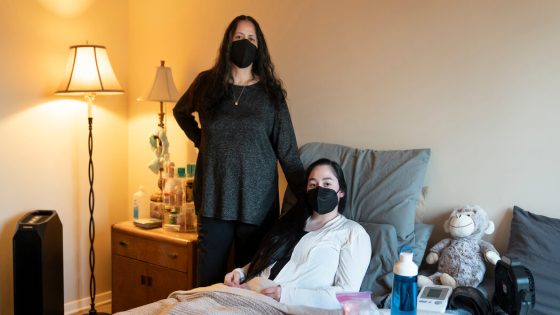Jessie Thompson, a 36-year-old mother of two in Chicago, is reminded of the Covid-19 pandemic every day.
Sometimes it happens when she picks up her children from day care and then lets them romp around at a neighborhood park on the way home. Other times, it’s when she gets out the shower at 7 a.m. after a weekday workout.
“I always think: In my past life, I’d have to be on the train in 15 minutes,” said Ms. Thompson, a manager at United Airlines.
A hybrid work schedule has replaced her daily commute to the company headquarters in downtown Chicago, giving Ms. Thompson more time with her children and a deeper connection to her neighbors. “The pandemic is such a negative memory,” she said. “But I have this bright spot of goodness from it.”
For much of the United States, the pandemic is now firmly in the past, four years to the day that the Trump administration declared a national emergency as the virus spread uncontrollably. But for many Americans, the pandemic’s effects are still a prominent part of their daily lives.
In interviews, some people said that the changes are subtle but unmistakable: Their world feels a little smaller, with less socializing and fewer crowds. Parents who began to home-school their children never stopped. Many people are continuing to mourn relatives and spouses who died of Covid or of complications from the coronavirus.
The World Health Organization dropped its global health emergency designation in May 2023, but millions of people who survived the virus are suffering from long Covid, a mysterious and frequently debilitating condition that causes fatigue, muscle pain and cognitive decline.
One common sentiment has emerged. The changes brought on by the pandemic now feel lasting, a shift that may have permanently reshaped American life.
Before the pandemic, Melody Condon, a marketing specialist in Vancouver, Wash., who is immunocompromised, said she had a stronger sense of confidence in other people.
“Unfounded or not, I believed that for the most part, others would take small actions to keep me and people like me safe,” Ms. Condon, 32, said.
But now she has encountered people who resist taking a Covid test or wearing a mask in some situations.
“What they’re communicating is that they don’t care about my health and my life,” Ms. Condon said. “I have lost so much trust in others.”
For Paris Dolfman of Roswell, Ga., a mild Covid infection in 2022 turned into an excruciating case of long Covid that has upended her life.
Ms. Dolfman, 31, is now mostly bedridden, depending on her mother for full-time care. But she said that her attitude toward life had broadened, in spite of her painful condition.
“One day I looked out the window and saw happy little birds on a branch, and I just imagined what it would be like to have the freedom to do what your body wants to do,” she said. “I decided to put my focus on the smaller things. Not to focus on the big picture, but to focus on the little things that I have.”
Clint Newman, of Albuquerque, spent the first year of the pandemic in isolation, alone in his apartment.
“I went over 12 months without touching another human being,” he said. “It was brutalizing. It scarred me pretty deeply.”
Mr. Newman said that he notices what he believes to be the lasting effects of the pandemic all around him.
“I see it in people’s anger, in people’s aggressive driving,” he said. “It just seems that there’s a lot of unhappiness and rage in the world right now. And I think a lot of that goes back to the lockdown.”
After Mr. Newman emerged from isolation, he realized that the trajectory of his life had changed, too. He decided that he did not want to be lonely again. After joining a dating app, he met a woman, Shay, and the two married in 2022.
“The pandemic is something I carry with me, consciously, all the time,” he said.
Four years after contracting Covid, Cindy Esch, of Liberty Lake, Wash., said that she has had to settle for a different life than the one she led before.
She and her husband used to go on adventures, especially on their sailboat, Passion. But her case of long Covid has been so difficult — she frequently feels intense fatigue that leaves her exhausted for days — that the couple was forced to sell their two-story home and move into a house with no stairs.
Doctors have told Ms. Esch that she and her husband must be extremely careful so that she does not contract the virus a second time, which could put her health even further at risk.
“I just don’t ever want to get Covid again — it’s something that we think about all the time,” she said. “It’s part of my daily life. It’s become a part of who my husband and I are.”
Source Agencies




